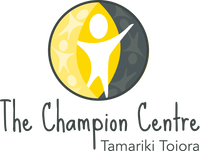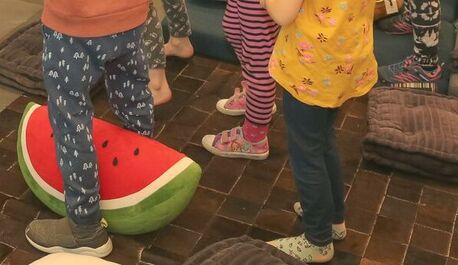Learning to understand the world is a process of steps. Often we aren’t aware of what those steps are because they unfold without much thinking or attention. We must be aware of our bodies, our sensations, and the coordination of ourselves in space and with others. We must become aware of our family and caregivers and find a way to communicate and connect. And with each of these steps we must find a way to stay regulated – emotionally steady and at ease – so that we can take in, process and feed back the information that is present. Music and movement can provide a way to achieve the regulation necessary to open up to the world. For one child in our session, stomping with movement and music is currently an important pathway to finding her way from overwhelm to calm. With stomping comes vibration, effortful control, expression, patterning, sound, rhythm, predictability, body coordination, and a whole-system integration. With stomping comes relief and the freedom to now give her focus to other things, other people, and other ways of engaging and interacting. This does not mean that stomping will always be necessary. Instead, it is a bridge and a learning as her body and brain find ways to create pathways of growth. It is also good fun, a form of play, and something that her peers and all the rest of us can join in with. Stomping and moving together to music that day in programme was about so many things. It was an experience of connection and relationship where we all joined together and got to know each other better. It was a scaffolding of neurodevelopment, physical integration, and emotional awareness. It was the coordination of expertise from the music specialist, the play specialist, the early intervention teacher, the speech therapist and the parent to find a small piece of child-led intervention and support. And it was an expression of what the child has told us about who she is, what she needs, and what her next steps are for ongoing development. Sometimes what happens in a session looks like simple child’s play. And it is! The world of child’s play is also a world of comprehensive planning, attunement, responsiveness, awareness and integration of intervention. For further reading:
https://brainwave.org.nz/article/supporting-childrens-social-and-emotional-development/ https://www.zerotothree.org/resources/1777-it-takes-two-the-role-of-co-regulation-in-building-self-regulation-skills https://www.parentmap.com/article/the-four-ss-of-parenting-dan-siegels-whole-brain-child https://www.championcentre.org.nz/uploads/1/2/7/2/127208613/guide-to-support-families-of-children-with-complex-needs.pdf References: Ginsburg, K.R. (2007). The importance of play in promoting healthy child development and maintaining strong parent-child bonds. Pediatrics, 119, 182-191. Moore, K. S. (2013). A systematic review on the neural effects of music on emotion regulation: implications for music therapy practice. Journal of music therapy, 50(3), 198-242. National Scientific Council on the Developing Child (2011). Building the brain’s “air traffic control system”: how early experiences shape the development of executive function. National Scientific Council on the Developing Child (2015). Supportive relationships and active skill-building strengthen the foundations of resilience. Working paper 13. Office of the United Nations High Commissioner for Human Rights. Convention on the rights of the child. General Assembly Resolution 44/25. November 1989. Schonkoff, J.P. & Phillips, D.A. (Eds). (2000) From Neurons to Neighborhoods: the science of early childhood development. Washington, DC: National Academy Pres. Szalavitz, M. and Perry, B.D. (2010). Born for Love: Why empathy is essential – and endangered. New York, NY: William Morrow. Trevarthen, C. (1999). Musicality and the intrinsic motive pulse: evidence from human psychobiology and infant communication. Musicae scientiae, 3(1_suppl), 155-215. Tronick, E. (2007). The Neurobiobehavioral and Social-Emotional Development of Infants and Children. New York, NY: WW Norton & Co. Yogman, M., Garner, A., Hutchinson, J., Hirsch-Pasek, K., and Golinkoff, R.M. (2018). The Power of Play: A pediatric role in enhancing development in young children. Pediatrics, 143 (3). Comments are closed.
|
- Home
-
What We Do
- Our Services
-
Our Programmes
>
- Monitoring Programme
- Family Support
- Speech and Language Therapy
- Early Intervention Teaching
- Physiotherapy & Occupational Therapy
- Musical Play Therapy
- Feeding experiences programme
- Relating and Communicating Programme
- Technology Assisted Learning
- Learning through Play
- Transition to School
- Early Intervention Educators
- LEGO-Based Therapy
- Advocacy
- Who We Are
- WAYS TO HELP
- Our News
- SHOP
- Contact

|
The Champion Centre is administered by the Christchurch Early Intervention Trust, and is registered with the Charities Commission (CC22708). Gifts of over $5 are eligible for tax rebates. © 2019 The Champion Centre
|


